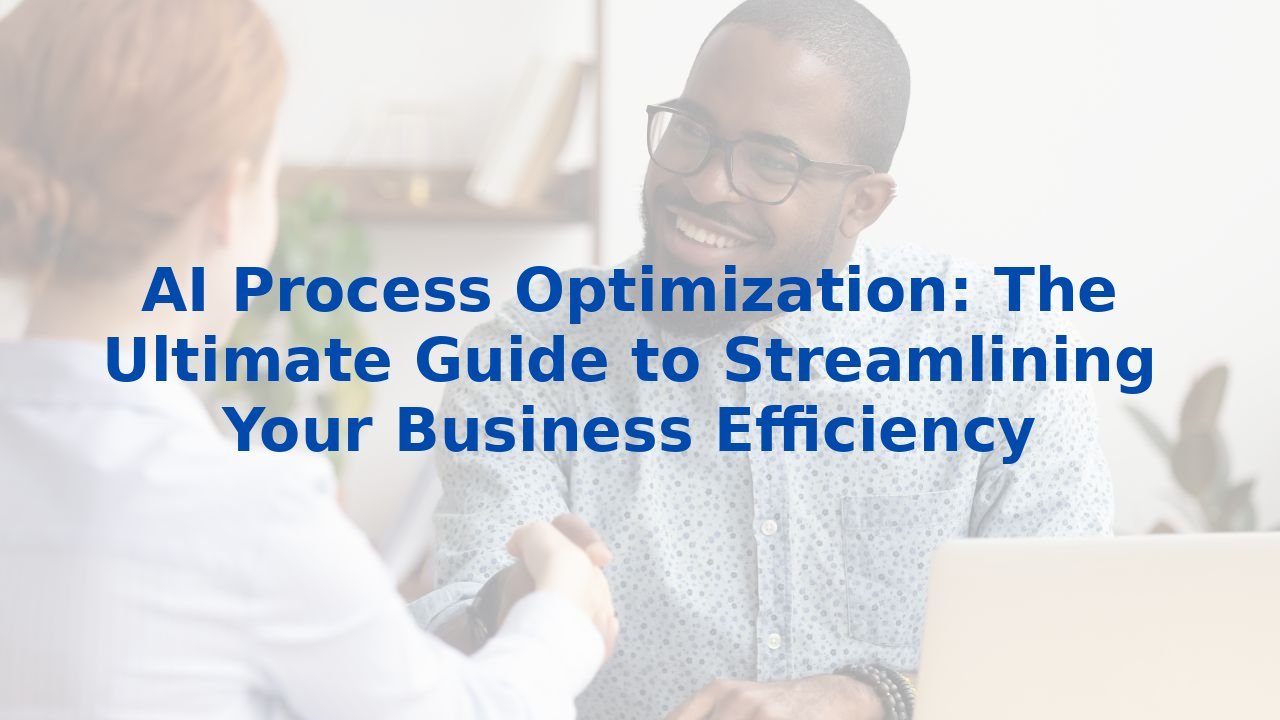AI Process Optimization: The Ultimate Guide to Streamlining Your Business Efficiency
AI Process Optimization: The Ultimate Guide to Streamlining Your Business Efficiency
In an age where every drop of efficiency counts, the quest for operational excellence has become a pivotal challenge for organizations. Enter Artificial Intelligence (AI)—the game-changer that can transform the landscape of business processes. By understanding how AI process optimization works, you can unlock unparalleled business efficiency and pave the way for future success.
What is AI Process Optimization?
At its core, AI process optimization involves leveraging Artificial Intelligence and machine learning technologies to refine business process management. This isn't just about automating tasks; it's about creating a smarter, more data-driven approach to achieving organizational goals. The primary objectives? Reducing errors, enhancing productivity, and improving efficiency.
The Key Benefits of AI in Business Process Management
Embracing AI in your business processes offers myriad advantages that can propel your organization forward:
1. Automating Routine Tasks
AI excels at automating tedious, high-volume tasks—think document processing as an example. Intelligent Document Processing (IDP) can take the wheel, relieving employees from the repetitive burden of manual data entry. This not only minimizes time and effort but also significantly reduces the likelihood of human error, freeing up your team to concentrate on strategic initiatives.
2. Improving Decision Making
Predictive analytics powered by AI analyze vast datasets to yield actionable insights. By utilizing AI-driven models, business analysts can simulate various scenarios and determine how price alterations might influence profitability. This level of insight positions decision-makers to make choices that balance customer satisfaction with financial viability.
3. Enhancing Customer Experience
AI is revolutionizing the customer service realm. Through the implementation of chatbots and advanced data analysis, organizations can identify customer pain points and optimize service delivery. AI assists in quickly processing customer inquiries, ensuring that teams can focus their energies on challenging cases that need human empathy.
4. Identifying and Minimizing Risks
One of AI's key strengths is its ability to spot anomalies and deviations within data sets, which helps businesses identify potential risks early. Automated monitoring tools help ensure compliance and operational integrity, laying the groundwork for a proactive rather than reactive approach to problem-solving.
5. Supporting Complex Decision-Making Processes
AI empowers teams facing complex decisions by synthesizing large volumes of structured and unstructured data. These insights enable organizations to grasp nuances that would traditionally go unnoticed, creating an informed approach that enhances overall strategy.
6. Real-Time Monitoring and Process Improvement
AI-driven process mining capabilities promote real-time analysis rather than retroactive assessments. This means businesses can identify trends, deal with anomalies immediately, and make data-informed decisions in the moment. The possibility of adapting on-the-fly creates a culture of agility and responsiveness.
Practical Applications of AI in Business Processes
The application of AI in business processes is both innovative and transformative:
1. Process Simulation
AI can streamline process simulation through historical data analysis. Machine learning algorithms detect patterns and relationships, allowing organizations to forecast key performance indicators, identify bottlenecks, and assess the potential impact of proposed changes ahead of time.
2. Automated Process Discovery
Imagine AI automatically mapping out your processes by examining data from your existing systems—this is exactly what AI can do. Its ability to visualize process flows helps uncover inefficiencies that are often overlooked but vital for performance enhancement.
3. Enhanced User Experience
With AI, design and management of business processes have become accessible to those lacking technical expertise. The tools available today can assist in everything from scheduling to note-taking during meetings, simplifying workflows across the organization.
4. HR and Recruitment
AI is making waves in HR by optimizing recruitment processes. By automating preliminary assessments of candidates, organizations can save valuable time and resources while ensuring a smoother candidate experience.
The Role of Employee Training in AI Implementation
However, the true power of AI can only be unlocked when employees are equipped with the right skills and knowledge. Here’s why training is essential:
1. Understanding AI Capabilities
Employees must be aware of AI’s strengths and limitations. Training ensures they'll know how to leverage data analytics responsibly and interpret AI insights for effective decision-making.
2. Adapting to New Technologies
As AI technologies evolve, employees must be adept at incorporating these tools into their workflows. Embracing education and skill development fosters adaptability and workplace resilience.
3. Collaboration with AI Systems
Training cultivates a culture of collaboration between human intuition and AI efficiency. Employees will learn to seek balance and maintain oversight, ensuring the technology complements rather than replaces human input.
4. Continuous Learning
AI is a fast-evolving field. Encouraging ongoing learning about emerging trends and tools keeps your workforce agile and better prepared to embrace innovations that enhance their work.
Conclusion
AI is not just a tool; it’s a catalyst for operational transformation. By optimizing processes, enhancing decision-making, and automating mundane tasks, organizations can elevate their efficiency to new heights. Coupled with comprehensive employee training, businesses can harness the full potential of AI, setting the stage for a future filled with opportunity and innovation.
Ready to explore AI training solutions? Dive deeper into these transformative technologies and elevate your organization’s capabilities through dedicated training offerings. Connect with specialists who can guide you in equipping your entire workforce with the necessary skills for the AI-driven future.



